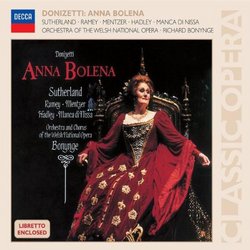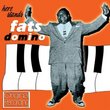| All Artists: Gaetano Donizetti, Richard Bonynge, Welsh National Opera Orchestra, Bernadette Manca di Nissa, Ernesto Gavazzi, Giorgio Surian, Jerry Hadley, Joan Sutherland, Samuel Ramey, Susanne Mentzer Title: Donizetti: Anna Bolena Members Wishing: 0 Total Copies: 0 Label: Decca Original Release Date: 1/1/2006 Re-Release Date: 10/10/2006 Genre: Classical Style: Opera & Classical Vocal Number of Discs: 3 SwapaCD Credits: 3 UPC: 028947579106 |
Search - Gaetano Donizetti, Richard Bonynge, Welsh National Opera Orchestra :: Donizetti: Anna Bolena
 | Gaetano Donizetti, Richard Bonynge, Welsh National Opera Orchestra Donizetti: Anna Bolena Genre: Classical |
Larger Image |
CD DetailsSimilar CDs
|
CD ReviewsAnna Bolena: the twilight of Sutherland's career M. Hall | OH, USA | 08/25/2007 (4 out of 5 stars) "Before taking apart this opera, as convention proves I must, I have to say first that I always find it incredible that opera listeners are so willing to lash out at the performance of singers, especially when most of us are quite unable to produce anything close to what operatic singers do. Certainly there have been performers who are simply not good singers, but history has proven that, despite her flaws, Joan Sutherland was one of the most gifted singers of the recorded era; her coloratura is unlike anything on record, and while her diction suffered during part of her career, the latter difficulty was attended to. Also, one must consider the selection of Anna Bolenas out there. Of note, there is Callas' live recording from 1957, Sills' studio recording that became part of the noted Tudor Queens trilogy, and then there is this recording from Sutherland in 1988. Obviously, there are other recordings out there, but none have attained the fame that these three have come to posses throughout the decades since they were recorded. Anna Bolena is not a role suited for many singers; I'm not sure there is a modern soprano who could pull it off at this point. (Perhaps Gruberova twenty years ago, or possibly June Anderson.) Regardless, this recording of Anna Bolena is fantastic simply because Dame Joan, already in her 60's, was able to produce a work of great control and beauty; furthermore her supporting cast is quite stellar. Susanne Mentzer is a wonderfully beautiful and lyric Giovanna Seymour. She has certain dark qualities that remind me a little of Giuletta Simionato or Marylin Horne, and yet she has a light and youthful tone that combines well with Sutherland's more matronly sound. Perhaps this isn't a historically correct idea, but this opera isn't historically correct to begin with, and therefore Sutherland's aged sound is quite appropriate. The Percy of Jerry Hadley is quite extraordinary, and one is often stunned by the sheer power and beauty of his performance. He is quite young sounding here, and sometimes it is a distraction because he is the love interest of Sutherland's older sounding Anna, but he is not beaten by any other modern Percy. Enrico VIII, sung by Samuel Ramey is quite awe-inspiring. He is truly evil sounding, quite like the malevolent pig that he is supposed to to be. In the past I have found great fault in Sutherland's male co-stars (like the men of her first Norma and her Semiramide); however, the assembled cast here is first rate. This recording of Anna Bolena was made the year that I was born, and therefore it is safe to say that Joan Sutherland's career was quite over by the time that I started to listen to opera. Initially I possessed one of the famous "Callas-only" opera biases that I've come to find rather amusing; I have, though, discovered over and over again just why Sutherland was crowned La Stupenda by the loggione at La Fenice. Her singing abilities are amazing. I have heard Sutherland from the beginning of her career in Maria Callas 1952 Covent Garden Norma and her 1959 Donna Anna (Don Giovanni) under Guilini, and to compare it to her Anna Bolena is quite interesting. It's clear that thirty-five years of high-flying coloratura has dimmed her voice by 1988, but Sutherland's technique and vocal power can still put many modern sopranos to shame. Despite the matronly sound, the increased vibrato, and a slight wobble, Sutherland is still able to produce a recording that incomparable to any other studio Bolena. Finally, I have to give notice to Richard Bonynge's conducting. I have a deep trepidation about Bonynge's conducting skills after hearing his work in the first Sutherland Norma, but in the case of this Bolena, maestro has found a creative balance that evokes the sense of bel-canto drama and the pathos necessary to feel for the doomed Queen." SUTHERLAND AT TWILIGHT L. Mitnick | Chicago, Illinois United States | 08/02/2007 (4 out of 5 stars) "I realize that there are many who feel that Joan Sutherland made this recording far too late in her career, and I rather feel the same way. However, in this particular case, I think it's better late than not at all. The voice, as heard here, is used cautiously, and there is no question that the once bright sound has dulled and dimmed noticeably. Sutherland was 61 at the time of this recording, and the fact that she is singing such a demanding role at this age is cause for amazement, for there is still some singing here that is pretty impressive. The top C's still ring out fearlessly (and also, I believe, a top D at the end of Act I!) and the florid vocal line is still well managed. Callas-like chest notes are virtually non-existent, and at points Sutherland actually makes some alternative upward transpositions in order to avoid the lowest notes of the role. This is really no big deal in the bel canto repertoire because other sopranos have done the same thing (has anyone ever heard the showy cabaletta to the aria "Bel Raggio" from Rossini"s "Semiramide" done exactly the same way by every soprano who's ever recorded it?), and at the end, makes an incredibly deft key-change in order for the Mad Scene to end on a top D flat rather than E flat. The voice does not sound young, but it really doesn't have to. After all, Anna Bolena is a mature queen, and she is anything but a youthful soubrette. Sutherland projects a vulnerable quality to her interpretation which is altogether appropriate ---- though it sometimes gets a little boring. Most importantly, there's an authority to Sutherland's singing here that was quite uncharacteristic of her singing in much earlier in her career. Her respectable success here is due in no small part to Richard Bonynge, who conducts this (and just about every other) Sutherland performance. He's an expert bel canto specialist, and he allows his singers to "sing". And what accomplished singers they are! Samuel Ramey is in youthful and splendid form as King Henry VIII, pouring out beautiful sound at every opportunity. Cynthia Mentzer is the youngest-sounding Jane Seymour I've ever heard (this role has been done in the past by much heavier mezzos like Marilyn Horne, Fiorenza Cossotto, Giulietta Simionato, etc), and her youthful and lyrical mezzo contrasts well with Sutherland's much more mature sound. Lastly, Jerry Hadley, in his first commercial recording, sings Percy with incredible beauty of sound. If he sometimes sounds like Anna Bolena's son ---- well, this is opera and not a motion picture. The tragedy of Jerry Hadley's passing just a few weeks ago has encouraged many to evaluate his recordings. He was a fine tenor, a cherishable artist, and this recording stands testimony to the fact that he was truly a "competitor". Truly, his Percy is the best to be heard on commercial recordings. In sum, with singers of this caliber, under Bonynge's sure leadership, "Anna Bolena" works. No, I'm not going to give up my Maria Callas or Beverly Sills versions, but will certainly appreciate this Joan Sutherland version for it's considerable virtues. The opera is presented virtually complete (which the Callas-live version is not), and the sound is first-rate. Finally, Joan Sutherland was one of a kind, and to have documentation of her singing this role, even with a voice that has passed its prime, is documentration to be respected and admired. Who could sing Anna Bolena today?"
|


